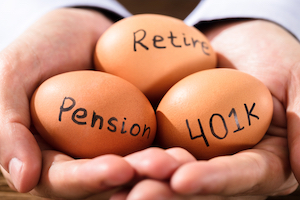 A survey by a group pushing a new retirement proposal finds that a majority of voters favor a new proposal like the one the group is promoting—which would give those who don’t already have access to a plan at work access to “the same savings plan as government employees.”
A survey by a group pushing a new retirement proposal finds that a majority of voters favor a new proposal like the one the group is promoting—which would give those who don’t already have access to a plan at work access to “the same savings plan as government employees.”
The survey—commissioned by the Economic Innovation Group (EIG)—focuses on the provisions of a new plan co-authored by what even the EIG characterizes as an “unlikely, bipartisan pair of economists—Dr. Kevin Hassett and Professor Teresa Ghilarducci”—a plan that would not only expand access to retirement savings through a program modeled after the federal Thrift Savings Plan for low-and middle-income working Americans (though those levels aren’t defined), including government-matched retirement contributions (you can read a perspective on the plan at ‘Haves’ and Have ‘Knots’). The release of the survey by EIG is doubtless intended to either lay the groundwork for, or to reinforce the interest in, the program—and, let’s face it, the survey’s results were focused on “voters.”
Not surprisingly, that EIG survey, conducted by Echelon Insights, finds that American voters (82%) across the political spectrum agree that retirement security is a problem for the country, although two-thirds of the survey respondents were very/somewhat confident that they would have enough savings to live comfortably when they retire. On the other hand, only 44% of Hispanic voters were that confident (though 78% of African Americans were, though they were most concerned about the ability of lower-income workers to save for their future).
‘Match’ Makings’
That said, only about half of the voter respondents with either a 401(k) or an IRA said their employer doesn’t currently offer a matching contribution. And while it’s not clear how many of those only have an IRA (and thus likely wouldn’t be expecting a matching contribution), the survey claims not only that more than half (55%) support the notion of a government-matching contribution—ahead of other government subsidies like Universal Basic Income (47%), child allowances (41%), and baby bonds (40%). However, nearly a third (32%) oppose the program, while 13% are unsure.
The survey explained the program to respondents as follows:
- Only available to low- and middle-income working Americans.
- Automatically enroll low- and middle-income working Americans into a retirement plan. Participants can choose to unenroll if they want.
- Allow for more Americans to invest and participate in the stock market the way Americans who have IRAs and 401(k)s do.
- Plan will be with workers throughout their lifetimes, meaning if they change jobs, their plan goes with them.
- The government will fully match contributions to these retirement accounts, up to a limit of 5% of a person’s annual earnings.
- The owner, or their beneficiaries in the event of the owner’s death, will be able to access these funds upon their own retirement or in the case of financial emergency.
- This plan does not replace current Social Security benefits. It is an entirely separate program from Social Security.
- The plan would offer extra assistance for very low-income working Americans, perhaps in the form of a tax credit offsetting their individual contributions.
- The plan is supported by both Democrats and Republicans.
Survey participants were also told that the government will only match contributions for workers whose employers do not currently offer a retirement matching program.
And the survey’s authors claim that support for the program increased from 55% to 63% after hearing those details (23% still opposed it, however, while 14% were unsure).
The survey findings were derived from a nationally representative survey of 1,000 registered voters aged 18+, conducted via online interviews, sampled from the voter-file matched panel hosted by Dynata. This survey was fielded March 15–19, 2021, and the data was weighted to known demographic and voter turnout characteristics of the registered voter population derived from U.S. Census Bureau estimates and the voter file.
- Log in to post comments
